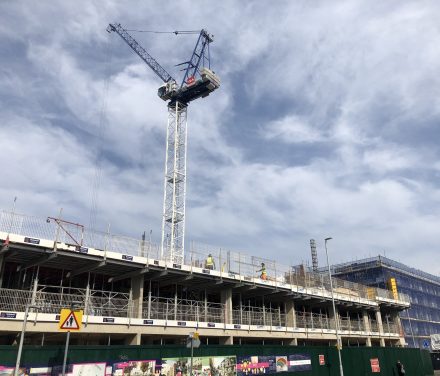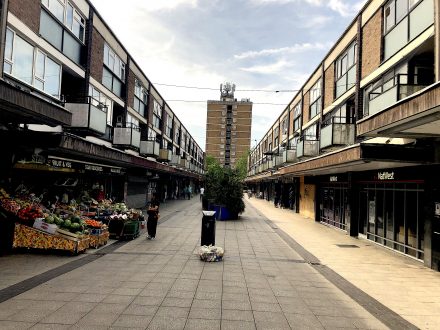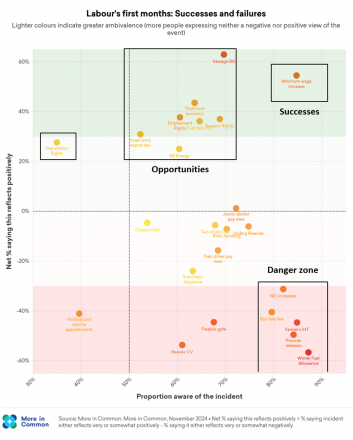Look up tonight, and you might see a satellite made in Stevenage. Once dubbed a “silicon suburb”, the unassuming new town is an aerospace, life sciences and tech powerhouse, and economically ranks in the top third of areas nationwide.
A Labour gain last year, some pollsters claim “soft left liberals” are over-represented here. You’d imagine that camp includes many of the smartly dressed tech workers LabourList saw marching into the station at evening rush hour on a recent visit, and the home-bound London commuters marching out.
You’d also imagine such economic success and demographics might slow the march of another group – Reform. But you’d be wrong.
A recent MRP poll put Reform ahead in Stevenage. In May, it snatched all bar one of the Hertfordshire town’s six county council seats.
Most ominously, even the deepest-red neighbourhood turned teal. In deprived Bedwell, Reform’s vote more than trebled from its tally in a by-election eight months earlier.
‘Lose Bedwell, lose Stevenage’ – and lose Britain?
LabourList paid a visit to explore not only that nosedive in heartland support, but also Labour’s remarkable recovery since.
Polling stations opened yet again in Bedwell two months later for a borough-level by-election, making the neighbourhood one of the most revealing and recent microcosms nationally for the Labour-Reform struggle.
Labour won, with Bedwell the only one of five Labour seats the party held onto in by-elections that day across the country.
The turnaround has attracted interest from Labour figures elsewhere hunting for clues on the Reform fightback, though little media attention.
Subscribe here to our daily newsletter roundup of all things Labour – and follow us on Bluesky, WhatsApp, Threads, X or Facebook.
And yet far more is at stake than that limited coverage would suggest.
“Lose Bedwell, and you lose Stevenage”, one local said. Past elections suggest if you lose Stevenage, you lose the country.
A bellwether seat since 1970, Stevenage’s demographics are so typical of red-blue marginals that think tank Labour Together said “Stevenage Woman” embodied Labour’s key target voter at last year’s general election.
From new Jerusalem to new town
Britain’s first new town may be a legacy of Clement Attlee’s government, but the roots of Reform’s surge did not take much digging for.
In Town Centre Gardens, part of Bedwell, a damaged concrete sign reveals the gardens were drawn up by a globe-trotting architect whose past work included literally building a New Jerusalem.
A bearded retired town planner stood peering at the sign. Stevenage is so “legendary” among planners that he had come to visit, but he expressed disappointment the town centre was “more run-down than I expected”.
Across the park, local nurse Stacey Rattue said she would shun the town centre altogether if it weren’t for the impressive playground, where she was pushing her young son on the swing.
Why? “I’m not trying to be rude, but the amount of people that live at that hotel…they follow you, they make you feel uncomfortable, asking for money.”
Asylum hotels, axed housing waiting lists
Two Stevenage hotels are now used for asylum seekers. They have prompted widespread complaints and claims across the town, starting long before protests and violence in Epping lurched asylum hotels back into current headlines.
Another woman unloading groceries from her car just up the road explained she was now “very much a follower of Tommy Robinson”, angered by asylum hotels, small boats and a sense that only “certain cultures can do what they like”. She said she now voted Reform.
Local Labour figures said the hotels clearly helped Reform take Bedwell in May.
Anger also fed into wider grievances over housing. Labour-run Stevenage council’s decision last year to cut almost 2,500 households from its social housing waiting list proved particularly damaging.
READ MORE: Labour Tribes Mapped: Interactive guide to Labour MPs
It reflected applicants’ minimal chances of being housed, given a backlog charities say it’d take 17 years to clear. But it fed suspicions migrants were being prioritised.
One local said it left even staunch Labour voters “jaded”. Her daughter was among those affected, after eight years waiting.
Meanwhile house prices are above the national average. Some social housing in the not-so-new town is almost 75 years old, and reportedly in poor condition. Cranes towering over new town centre developments exacerbate some voters’ belief that the only homes built are “high rise flats for non-Stevenage people”, as one Labour source put it.
Labour’s by-election revival

It was no wonder that shortly before June’s by-election, several residents confidently predicted Reform would take another Labour scalp.
Labour wasn’t helped by the fact its own councillor’s resignation triggered the contest, in opaque circumstances. Many voters and other local sources were conspicuously tight-lipped, noting only that the vacuum had fuelled lots of unspecified speculation. LabourList was unable to reach Conor McGrath for comment.
And yet Labour defied the doubters. Candidate Dermot Kehoe managed a respectable 43.2% vote share, reportedly down just 2.5 percentage points, to Reform’s 34.5%. It bucked a trend of losses that day nationally to not just Reform but also the Greens, Lib Dems and even Conservatives, underlining Labour’s complicated balancing act.
So what was the secret in Stevenage?
‘Reform was a protest vote – minds were not set’
“This is about the white-working class voters who have gone to Reform that some activists have written off. What we’ve done here is prove that’s not true. They are still here,” said one local activist.
Another local Labour source said some voters admitted backing Reform at county level had been a protest. Investing time in listening and repeat visits to those “willing to listen, but who need convincing” were crucial. “Minds were not set. I’d be concerned if people weren’t listening, but lots are. We can still have conversations.”
It started with an explicit listening exercise before the campaign began. Voter priorities quickly became explicit Labour priorities. “The biggest things that came out were asylum hotels, antisocial behaviour and parking.
“So those three went on the leaflet. We just went to voters where they were at, and focused relentlessly on those issues.”
demonstrating the positive changes Labour were making to people’s day to day lives 🔁
Just two months later, Bedwell Ward has voted by 3 figures to back Labour again in today’s by-election. Dermot will be an incredible champion for Bedwell residents and I can’t wait to work…
— Kevin Bonavia MP (@kevinbonavia) June 26, 2025
Tacking right on asylum hotels
The leaking of a council letter to one asylum hotel – conveniently leaked just six days before polling day – proved a second key development in the campaign. It reportedly urged the owners to stop housing asylum seekers, and threatened enforcement action.
Officials questioned the hotel’s compliance with planning law, namely whether housing asylum seekers made it a hostel not a hotel – which would need separate permission. Hotel owners declined to comment to local paper The Comet.
“We really emphasised that. There were targeted letters and canvassing for people we thought would react most positively to the news,” the activist said.
“We had something positive to say to voters that were going to Reform. It wasn’t just, ‘Reform are horrible’. As the Jeremy Corbyn team found in 2019, that doesn’t work.”
Many Labour supporters will baulk at the hardline stance on vulnerable people seeking refuge. But others will hope Stevenage’s planning team sets a precedent other authorities can follow.
Concrete results on housing

Campaigners emphasised addressing the issue alone wasn’t enough, however. Equally crucial was a sense Labour was serious about “practical delivery”.
It helped that mid-campaign, the Spending Review committed to stop hotels housing asylum seekers by 2029. “We were able to use that in the narrative too.”
Labour literature also highlighted the council’s recent renovation of four central apartment blocks. “They’re seen by thousands of people a day, and they look really good. You link Labour to the things people can see, and feel, are making lives better – that’s when they’ll turn out. “
READ MORE: Runcorn Labour candidate Karen Shore petitions to close asylum hotel after right-wing criticism
Campaigners could also point to 143 newly built homes at a former Matalan site, notably all for affordable rent.
The insights – intuitive, but not always applied – chime uncannily with new research on lessons from Australian Labor’s similarly stark electoral transformation earlier this year. Authors Claire Ainsley and Deborah Mattinson, previously advisers to Keir Starmer, explained how “tangible proof points of delivery”, consistently trumpeted and attributed to government, were crucial. For Anthony Albanese, it was new urgent care centres.
Is it the economy, stupid?
There is clearly more to Reform’s success nationally and locally than immigration though, and there was more likewise to Labour’s fightback in Bedwell.
The cost of living came up regularly on the doorstep in both campaigns. The woman who praised Tommy Robinson complained about rising food prices, particularly having recently lost her job – something blamed in turn on Labour’s national insurance hike.
Another local called winter fuel cuts the “nail in the coffin” for Labour in May’s county elections. They said a local charity was inundated with demand for help claiming pension credit, and some pensioners were “living in one room” to minimise heating bills.
So it was likely no coincidence that sandwiched between Labour’s county defeat and its borough success eight weeks later in Bedwell was the government’s winter fuel U-turn.
One county council worker walking briskly through the town centre praised the reversal.
It pays to make work pay
National polling suggests winter fuel cuts have had the highest cut-through of any Labour stance to date in government. But among positive measures, Labour’s minimum wage hike was the most known and most appreciated.
Asked what national policy resonated most in Bedwell’s second, victorious campaign, one local activist didn’t miss a beat. “Make work pay. People getting more money in their pockets is the big one, especially in Bedwell.”

Christabel Cooper, research director at Labour Together, told LabourList the cost of living was actually the “top issue” for direct Labour-Reform switchers, above immigration.
Cooper, who co-authored the report first identifying ‘Stevenage Woman’, noted that recent research found higher economic insecurity among those switching away from Labour, and that the “Stevenage Woman” archetype is particularly economically insecure.
The battle for the ‘don’t knows’
For Cooper, the big story of local elections nationally was not such switchers, however. It was the fact economically insecure, median voters like Stevenage Woman – who backed Labour in 2024 – didn’t vote at all. “People are forgetting about this voter. I strongly suspect she’d be saying ‘don’t know’.”
Several women interviewed by LabourList in Stevenage were unsure how, or if, they would vote at the next general election, and one suggested it was too early to say how the government was doing. Another admitted she had probably thrown away local election leaflets, but would “just need to sit down and start consuming information” nearer a national contest.
Right-wing media outlets’ fixation on Reform, and pollsters’ exclusion of ‘don’t knows’ from headline results, likely explain that undertold story.
Data tables buried on YouGov’s website show 12% answered “don’t know” in its most recent poll – more than twice the six-point gap between Labour and Reform.
Cooper suggested there was still all to play for among such voters at the next general election.
“They’re not especially ideological, so they’re not being pulled one way or the other. Whether they can be persuaded by Labour to come back, or see Reform make an overture to them, or just sit it out – is the big question.”
Are you based in Stevenage, or have you seen similar Labour successes against Reform elsewhere? Get in touch to share your take at [email protected].
- SHARE: If you have anything to share that we should be looking into or publishing about this story – or any other topic involving Labour– contact us (strictly anonymously if you wish) at [email protected].
- SUBSCRIBE: Sign up to LabourList’s morning email here for the best briefing on everything Labour, every weekday morning.
- DONATE: If you value our work, please chip in a few pounds a week and become one of our supporters, helping sustain and expand our coverage.
- PARTNER: If you or your organisation might be interested in partnering with us on sponsored events or projects, email [email protected].
- ADVERTISE: If your organisation would like to advertise or run sponsored pieces on LabourList‘s daily newsletter or website, contact our exclusive ad partners Total Politics at [email protected].
labourlist.org (Article Sourced Website)
#Asylum #bills #Labour #quietly #lost #Stevenage #Woman #won #LabourList
